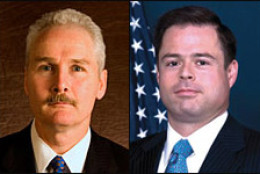ACT-IAC
-
In his first public comments since the portal launched, federal CIO Steve VanRoekel said agencies and contractors can learn from the problems the website encountered. He said many times big failures provide the opening for major changes.
October 30, 2013 -
Acting Deputy Secretary Rafael Borras said the goal of the new Management Cube is to merge back-office data into one platform. Data analysts will then find trends and discover opportunities to improve mission investments. The Homeland Security Department will launch the initiative in January.
October 29, 2013 -
Jim Williams and Rick Holgate from ACT-IAC will fill us in on next month's 2013 Executive Leadership Conference in Williamsburg Virginia. September 17, 2013
September 17, 2013 -
The General Services Administration will focus on its core mission and let others provide payroll and human resources services. The decision comes as shared services is gaining momentum as OPM is pumping some energy back into the HR line of business, and the Interior will release a new geospatial platform to host data and applications.
September 13, 2013 -
HHS approves Amazon Web Services for meeting security requirements under the Federal Risk Authorization Management Program. The company's secure documents are available for other agencies to review to help accelerate their move to the cloud.
May 22, 2013 -
The administration is expected to release a new directive in the coming weeks to update Circular A-127, which defines how agencies operate their financial systems. The new guidance is expected to open the market up to vendors and make it easier for agencies to transition to shared service providers.
May 21, 2013 -
Three Department of Homeland Security components are testing how ongoing authorizations work. The Office of Management and Budget is drafting a memo to require agencies to change from approving the cybersecurity of systems every three years to a more regular oversight schedule.
May 08, 2013 -
The CIO Council will add 25 more examples of IT project management excellence to its best practice database. DHS CIO Richard Spires said at the Excellence.gov awards Tuesday the goal of all of these success stories is to share what worked and leave a broader legacy across all of Federal IT.
March 06, 2013 -
Through the Digital Government Strategy, several initiatives are underway to address IT security concerns. DHS created a security baseline architecture and is testing it through five use cases. GSA created a new secure online content platform for agencies to move websites and applications into a mobile environment.
February 08, 2013 -
The authors of a special report on health IT initiatives join In Depth with Francis Rose to discuss health IT initiatives.
February 04, 2013 -
The mobile revolution isn't new to many agencies. Laptops and BlackBerrys have been standard issue for many government executives for the last decade. What is different, however, is the widespread use of smartphones and tablet computers. Both agencies and citizens hold new and more immediate expectations because of these devices, and the government must adapt to this technololgy. In our special report, Gov 3.0: It's Mobile, Federal News Radio explores how some agencies are meeting the demand internally and externally for mobile devices and apps. The challenge, like any new technology, is ensuring these devices actually help meet mission goals and don't become just another shiny toy.
December 07, 2012 -
The two agencies met this week to figure out how best to implement the recommendations in a white paper from ACT-IAC. The approach detailed in the document follows closely the methodology used to develop the NIEM and FICAM standards.
December 05, 2012 -
Organizers for the Executive Leadership Conference, which was canceled this year because of Hurricane Sandy, said they will begin processing refunds this week.
November 14, 2012 -
Better leveraging technology in a handful of key areas could help solve pressing national challenges, improve the quality of government services and reduce the federal deficit by more than $200 billion. That's the main takeaway from a collection of reports that make up the 2012 Quadrennial Government Technology Review, commissioned by the American Council for Technology-Industry Adivsory Council's Institute for Innovation. Anne Reed and Molly O'Neill, the two co-chairs of the institute's steering committee, and Wendy Henry, a member of the steering committee, joined In Depth with Francis Rose to discuss the reports' findings.
November 14, 2012 -
The Executive Leadership Conference scheduled to take place this week in Williamsburg, Va. has been canceled because of Hurricane Sandy.
October 28, 2012



